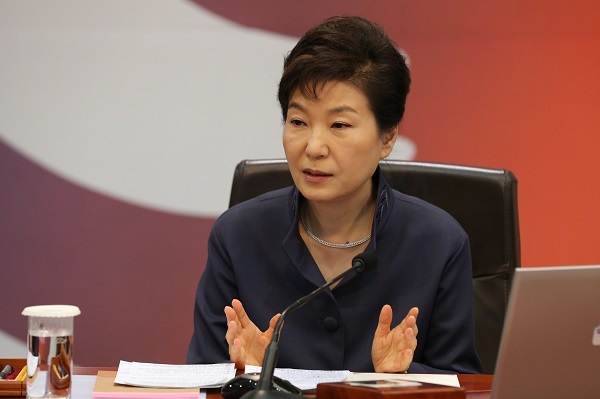President Park Geun-hye on Tuesday spoke up about her administration’s controversial reintroduction of state history textbooks, saying inaction threatened the “souls” of young Koreans.
“One would have no soul without knowing the history of one’s country, and learning it in a wrong way would turn one’s soul into an abnormal one,” she said at a Cabinet meeting.
 |
| President Park Geun-hye speaks during a Cabinet meeting, Tuesday. (Yonhap) |
Park urged the National Institute of Korean History in charge of the publication to put efforts into gathering the “best” experts in the field to author the books to be used in middle and high schools from 2017.
“The government has promised the people it will create a proper history textbook that contains the proud history of ours. For this it is of the utmost importance to create a pool of writers with that capacity,” she said.
Park’s comments came as the NIKH has been facing difficulties lining up writers. One of the lead authors, professor Choi Mong-lyong, resigned over sexual harassment allegations last Friday.
As opposition among progressives continued against the state-authored textbooks, the NIKH said Tuesday it had secured 75 potential authors including 25 volunteers that submitted their names during the recruitment period that ended Monday. The institute said the list would remain confidential for now for security reasons.
Park also took aim at opposition political parties, which agreed to resume the parliamentary schedule over the weekend despite the ongoing textbook brawl to tend to budget reviews and pending bills.
“The textbook issue should not and cannot be subject to political fighting,” she said.
Park further elaborated on some of the contentious points, including the date of South Korea’s foundation.
“The future of the Republic of Korea that has the history of division depends on our youth at this important juncture where we must realize reunification. It depends on their sense of pride and accurate perception of history,” she said.
She said that current textbooks describe the year 1948 as the foundation of the South Korean “government” while it specifies North Korea as a state as being established the same year. Conservatives see this as implicitly favoring North Korea.
Progressive scholars say the establishment of the “South Korean government” is meant to uphold the Constitution that states the current government succeeds the provisional government established in 1919.
She added that the textbooks also depict both Koreas to be at fault for the Korean War (1950-1953) and that South Korea’s “economic development praised by the world is described as being antilabor and only depicts the negative side of the conglomerates and thereby stokes antibusiness sentiment.”
The opposition has been claiming the new textbooks will aim to glorify the past pro-Japanese and dictatorial governments of the 1960s and 1970s, including rule under former President Park Chung-hee, the late father of Park, by highlighting the rapid industrialization and economic growth.
The main opposition New Politics Alliance for Democracy immediately shot back at Park’s remarks.
“It is shocking how preposterous (Park’s comments) sound,” said NPAD spokesman Kim Seong-soo in a statement.
“It indeed must be a scary situation as, according to the president, our public has distorted souls by having learned from the wrong textbooks.”
Park also pressed lawmakers to speed up the review and approval of key bills, including those aimed to boost the economy, create jobs and reform the labor sector.
The president specifically urged for the prompt ratification of free trade agreements with China, New Zealand and Vietnam.
“If the National Assembly neglects these bills and leaves them to be disposed of automatically, the people shall not condone it,” she said.
By Cho Chung-un (christory@heraldcorp.com)

